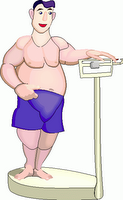 I am just back from an interesting chat by Dr. Tony de la Mare who is doing research into the use of the BMI both for health and in comparison to athletic performance.
I am just back from an interesting chat by Dr. Tony de la Mare who is doing research into the use of the BMI both for health and in comparison to athletic performance.For those who are not aware the BMI is a simple and very general measurement taken as the subject's mass in kg divided by (their height in meters - squared). For more information see the entry at Wikipedia.
Now as many readers will know the BMI receives a great deal of criticism as being too general and not taking into account differences in body composition and genetics. Much ofthat criticism is valid but the general message of Dr. de la Mare's chat still holds:
Those outside the healthy range (certainly above 30) are at significant risk for disease and early mortality. Notable with the huge increase in risk for Type II diabetes as one's BMI increased. He explained that we are seeing a significant increase in dabetes in kids as young as 15 who overeat and undertake little or no physical activity.
One criticism is that large, well-muscled, athletes have their BMI skewed. The belief is that thier extra weight is muscle - good weight - and that it might put them intothe so-called "obese" levels of BMI.
Not so, in general. Dr. de la Mare presented BMIs from a variety of elite athleetes and all of their numbers were in a similar range - for men typically 20-24 and for women typically 20-22. Even ice hockey players and rugby players who are more muscular were in the 26-28 range - still well below so-called obese levels. There would seem to be an ideal BMI for aerobic performance at least, with runners (20), mountain bikers (22), and X-C skiers (23) all in the same range.
BMI and Rowing
As there were no data on rowers presented I did a little digging on the net. Data presented for the 1992 US Olympic Team at Dr. Stephen Seiler's excellent site suggest a BMI of 23 for both male and female rowers and data presented on the Cambridge University Crew from 2005 on the BBC web site puts them at 24. Again, despite being taller and more muscular these elite rowers have a BMI in the same healthy range as for other endurance athletes.
What does this mean for you?
Well, for the recreational athlete a high BMI is not likely to be because you are "big-boned." Don't fool yourself, and check with your doctor. At the same time, these are data for elite athletes. Most of us cannot expect to match them, but we should all aim to be in the healthy range nonetheless.
The BMI defines a place to be for both health and performance - but there is no correlation beyond that. If one were to rank the BMIs and erg scores of National Team athletes one cannot at all expect BMI to be a performance predictor within this group! In otherwords being in the ideal range is necessary for membership in this elite club, but it does not predict how you will perform once you get there.
